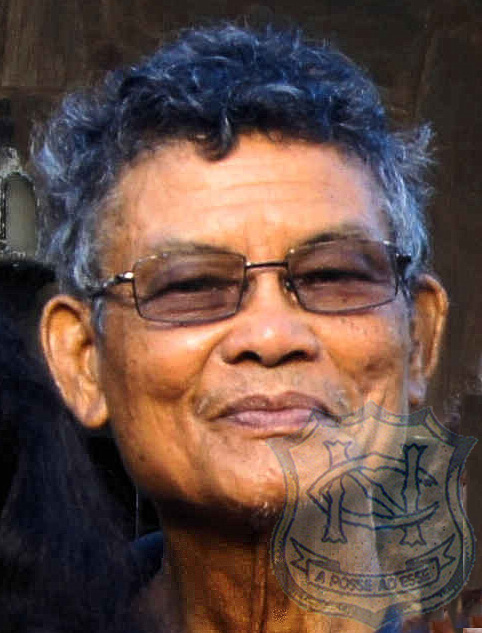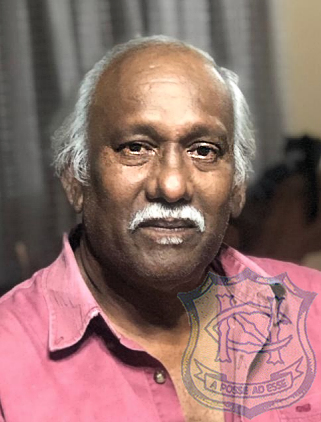 |
 | NAPARIMA COLLEGE
FOREVER
| |
|
 | 
(photo: krm) |
 |
James Lee Wah: Eulogy
by David Sammy
EULOGY FOR JAMES LEE WAH
Let me begin this abridged version of the life of James LeeWah with an event that helped to shape his philosophy.
These are his words,
“ I remember one day I think it was in 1950, attending a dance show put on at the Empire Cinema San Fernando by Geoffrey Holder. The power of that show hit me somewhere in the centre of my being. I was completely enthralled by the talent and versatility of the mighty Holder who danced and sang and beat drum. At that moment I knew what I wanted, that magical power of the artist to touch and transform, to make us see who we are”
James Lee Wah was born in Tableland but his family soon moved to San Fernando and settled at Bertrand Street. He attended San Fernando Government Primary School and won a government exhibition to Naparima College in 1942. There he excelled in his studies and at Senior Cambridge Higher Certificate (now CAPE) he twice placed second for the Island Scholarship. In those days only the first placed student was given financial assistance by the government.
During his years as a student he distinguished himself in the literary activities of the school such as the Elocution and Oration contests , the Senior Literary and Debating Club and the Dramatic Society. In conversation with Mr.Lee Wah, he said that he tried every sport available to him but soon realized that his strength was in swimming, so he often swam to Flatrock and back. On leaving school he was employed at the College for a year and a half, during which time he wrote the scholarship exam to the University College of the West Indies, Jamaica. He won an Open Scholarship and left for Jamaica in 1951.
There he blossomed. He completed his English Honours Degree and then stayed on to read for his Diploma in Education. Victor Edwards, leading educator, playwright and director in his book Secondary Schools Drama Associations, quotes Lee Wah as saying.
“I remember acting along with P.J. Patterson later Prime Minister of Jamaica, as bailiffs in Juno and The Paycock.”
He then co-produced the morality play ‘Everyman’ which gained the attention of theatre critics in Jamaica. In the Dramatic Society of the University College, he worked closely with Errol Hill, Slade Hopkinson, Derek Walcott and Rex Nettleford, who all became luminaries in Caribbean Theatre, and internationally. It was in this milieu that he also met his future wife, an already established-actress - Mavis Arscott.
James Lee Wah returned to Trinidad in 1956, was re hired at Naparima College, got married in 1957, and immediately embarked on a journey that would leave its mark on Naparima College, San Fernando, and Trinidad and Tobago.
At Naps, now a graduate teacher, Lee Wah continued the work of his predecessors by expanding the Shakespeare Festival to higher forms. Errol Sitahal, Brinsley Samaroo and Kenneth Ramchand were outstanding acting talents unearthed. The Blue Circle Network, a student radio programme over the PA system developed the skills of future broadcasters Trevor McDonald, Bobby Thomas, Ashton Chambers, Leslie Thornhill, as well as meteorologists Rabindranath Maharaj and Harold Hosein.
Drama and Speech became part of the Form 1 Curriculum and Inter–Class Drama gave everyone, not only students of Literature an opportunity to perform. It was an exciting time to be at Naps and Lee Wah helped to nurture that artistic atmosphere. Writers emerged amongst staff members like Hafezool Sukoorali and Melville Foster who brought honours to the college at the Secondary Schools Drama Festival. Edison Sookoo excelled in design.
In 1966 Lee Wah became the Vice–Principal but still taught Drama, Language, Literature and General Paper. Many dramatists, artists and set designers, ‘diamonds in the rough’ were discovered in a rich vein from 1963-73. Permit me to call the names of those who were practitioners after leaving Naps: Ralph Maraj, star of stage and screen, Tony Hall, Dennis Hall, Walid Baksh, Devindra Dookie, Henry Daniel, Dennis Noel, Errol Fabian, Shakar Mahabir, Toodesh Ramesar, Terrence Brathwaite, Heathcliff West, Shastri Maharaj, Kenwyn Crichlow and Kemal Manickchand. I apologise for any omissions.
Concurrently outside the halls of Naparima, LeeWah became the Artistic Director of the Drama Guild in 1956 after its founder Horace James left for Port of Spain, and then England. Under Lee Wah’s guidance they produced over thirty plays. An outstanding actor from that group who became an international star was Sullivan Walker. Notable actors included Ronald Bickram, Mavis leeWah, Monica Davis, Stephanie King, Gemma Allong. Lee Wah’s personal growth and development in theatre continued as he obtained a USIS Scholarship to Yale University to study drama and later a British Council Scholarship to City University London to study Theatre Management.
Lee Wah was always concerned about getting people involved in the arts and providing a forum for their expression. To this end he founded these organisations:
- Secondary Schools Drama Association (1965).
- San Fernando Arts Council(1969).
- San Fernando Theatre Workshop (1976) producing over forty plays.
- National Drama Association of Trinidad and Tobago (1980). Under the umbrella of the Arts Council, Lee Wah created the Gayap Magazine (1971), a publication which focused on cultural activities in the South, but also shone a bright light on the broader issues affecting its citizens.
His expertise was often sought at the national level. He was selected to be the Stage Manager for our cultural contingent to the World Fair Expo ’67 in Montreal Canada. His lifelong friend Torrence Mohammed of Arawaks Dance Group was also part of that group. Ten years later he had a similar role at the Festival of the Arts in Lagos Nigeria. He was also a vital contributor in the Carifesta Contingents to Cuba 1979 and Barbados 1981.At home he managed the Best Village Finals from early as 1964.
Fully occupied with his teaching and drama James Lee Wah was not happy with the state of things in San Fernando and entered into a phase of Advocacy. That he could find more time in a 24 hour day is a tribute to his family especially his wonderful wife Mavis. Thus in 1976 the San Fernando Citizens Action Committee was born with two of its stated aims being:
- to serve as the watchdog of public interests
- to help in all efforts at preservation and conservation of the environment.
To put their words into action:
- in 1977 they had a bumper sticker campaign “Save The Hill”, and they held a demonstration for the same purpose; were it not for him the Hill today would be a knob.
- In 1978 they again had a bumper sticker campaign “Build The Gulf Bridge” in reference to spanning the Cipero River to give another access point to San Fernando.
- In June 1979 they held a seminar at the Town Hall entitled “Planning For A Better San Fernando” at which the Foreshore Reclamation Scheme was discussed.
(two out of three is not bad)
LeeWah’s clarity of thought, even temper and intelligence made him a hot commodity to hold positions of responsibility. He became:
Chairman of the Naparima Bowl Board,
Chairman of the San Fernando Museum Committee,
Member of the National Cultural Council – 1971-1983
His days were spent in teaching and his evenings in meetings or rehearsals striving for excellence in every pursuit. Dr. Allan McKenzie then Principal of Naparima College paid tribute to LeeWah on his retirement in 1988, saying,
“ it is my considered opinion that society generally has not accorded James LeeWah the recognition which he abundantly deserves for the tremendous contributions to the arts, the humanities and the promotion of indigenous culture in our country”. End Quote.
In 2010 James Lee Wah was recognized for his contribution to our country by being awarded an Honorary Doctorate by the University of Trinidad and Tobago in the field of the Performing Arts. He accepted with humility.
He received an Award of Excellence from the Ministry of Education in 2014, and
in 2019, the Greater San Fernando Chamber of Commerce also honoured him.
In reality he was a simple man of the people, an activist and an environmentalist, long before that word became fashionable. He was not prone to exaggeration or bombast and used his great facility for language with precision like a scientific tool. Those of us who joined the movement knew that this individual was determined to alter the landscape by initiating conversations that challenged the norm and by empowering people to be agents of change. He saw the creative sector at the forefront of this thrust. In his editorial of the Gayap Magazine(1976-1977), he said,
”We have got to find the dynamics to unleash the dominant creative energies of this society. In the final analysis who wields the power? Is it the thinking creative man [person] or the politicians? And is such power being used for selfish, destructive, repressive ends or to shape a better quality of life for all”.
That was James Lee Wah the militant.
He was a teacher, dramatist and advocate, a brilliant man whose vision and undying commitment to our country has left a legacy of institutions which will continue to enrich our lives.
I offer this view through the eyes of Ken Rajkumar Maharaj, lecturer and poet and former Naparima student who penned these few words,
“... the world is different today, a little emptier, without the knowing that he is there. He was always there for us, all our lives, a graceful and gentle teacher and friend. We all go on diminished, but fuller and stronger from having shared a lifetime with him.”
The members of the San Fernando Theatre Workshop would like to thank him for his patience while training and guiding us in our craft. Once however I heard him use the four letter word …..‘damn’ in an exchange with his friend Willi Chen about the set. We spent many stimulating hours at the Naparima Bowl in rehearsals trying to get it right and in his reticence which we often thought was sleep, we got the occasional compliment.
Goodbye to our mentor as the curtain closes.
 David Sammy,
David Sammy,
San Fernando Theatre Workshop.
July 8th 2020.
James was also memorialized in a separate eulogy by Dr Dowlath, the principal of Naparima College.
|  |
|